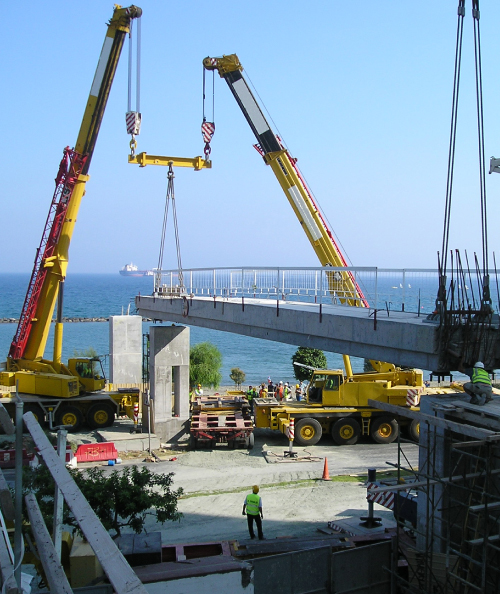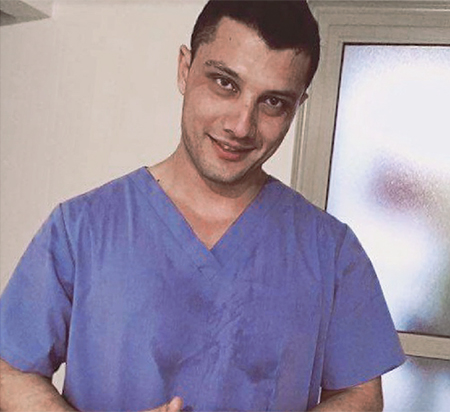PROGRAM DETAILS
Duration18 months (full time)
Fees
€9,000 for whole program
LanguageEnglish
CampusNicosia
The MSc in Structural Engineering program of study provides the opportunity to Civil, and other relevant engineering degree holders a fast-track approach towards a professional career in the area of Structural Engineering as it applies to Civil Engineering structures. This is a highly concise and practical program geared towards providing the state-of-the-art skills necessary for immediate entering or reentering practice at the highest level. The MSc in Structural Engineering aims to provide further technical knowledge in the area of structural engineering and it is intended to provide the educational platform to encourage the development of competent, confident, articulate, numerate and inquisitive postgraduates who are able to link theory with practice; hence postgraduates can look forward to playing a leading role in the profession providing for the safety and welfare of the public.
The program covers fundamental and modern structural engineering subjects providing a combination of analytical and design topics as well as experimental techniques and the use of computers reflecting current and likely future practice. The analytical work will include the theoretical framework of the matrix methods and the use of modern structural analysis software leading to the development of problem solving skills for the analysis of complex engineering structures. The design-related subjects will be taught in accordance with the latest European and national regulatory and legal framework (Euro codes), which provide the most up-to-date specialized knowledge and technical competences.
The successful completion of the program requires the completion of a thesis covering a topic related to structural engineering. The research activities involve combinations of experimental, numerical and theoretical work. Research will be promoted by means of encouraging the development of collaboration networks between the university and other academic and social partners on a local, regional (Mediterranean) and international level. The establishment of such networks is critical as a means of acquiring experience, achieving effective exploitation of research results, good practice examples and innovation.
The language of instruction is English.
Upon successful completion of this program, the students should be able to:
1. Acquire the ability and skills to analyze and design civil engineering structures as professional Structural Engineers
2. Provide the engineering and scientific background for further studies or research
3. Provide further knowledge of engineering principles and develop an ability to interpret and evaluate structural engineering problems
4. Obtain an in depth comprehension of the European and national regulatory and legal framework (Euro codes and National Annexes)
5. Develop detailed knowledge on the assessment of the structural integrity of buildings
6. Understand the techniques of structural modelling and use a significant range of analysis and design software skills
7. Understand the properties and applications of modern materials, equipment and methods of construction of civil engineering structures
8. Evaluate the dynamic and earthquake behavior of structures
9. Design and create innovative structural configurations
10. Plan and execute a significant project of research, investigation or development within the context of structural engineering
11. Critically review existing practice and develop original and creative solutions to problems
12. Communicate and work effectively with peers and academic staff in a variety of tasks, demonstrating appropriate levels of autonomy and responsibility
13. Be capable of using research results in education, within their professional environments and in society
14. Work independently to acquire knowledge, review and evaluate current research results and conduct individual research
15. Be able to gather information about the main local and international funding opportunities for participating in research consortiums and funded research
The MSc in Structural Engineering is developed to meet the needs for education in the field of structural engineering by providing the skills needed to key professionals, who are or will be active in the private sector, in governmental institutions and local authorities and as consultant engineers.
Specifically, the proposed program will provide the skills for:
- Engineers who have recently completed their Bachelor studies in Civil Engineering or a related engineering discipline and seek a higher and focused education before entering the market
- Engineers who have recently completed their Bachelor studies in civil engineering or a related engineering discipline and seek to get involved in research and acquire an MSc before pursuing a PhD degree
- Engineers who wish to engage in consulting in structural engineering
- Professionals with experience in the field, who wish to extend their knowledge and place emphasis on the topics covered by the programme
- Professionals from public and semi-public organisations, whose work is related to structural engineering and related legislation
Specific Admission Requirements
Candidates’ minimum qualifications for admittance to the program are:
- Bachelor's Degree from an accredited University in Civil or any related engineering field
- Fluency in English
In the case that the number of candidates may be greater than the maximum number of students that can be admitted to the program, additional criteria for the selection of the students would be:
- Bachelor's degree overall Grade Point Average (GPA);
- Professional experience
- Knowledge and experience in the use of information and communication technologies
Recognition of Prior Learning
There are no specific arrangements for recognition of prior learning for this Program. Candidates can be granted transfer credits according to the general arrangements for recognition of prior learning of the University.
There are no specific examination regulations, assessment and grading methods employed by this Program. The examination regulations, assessment methods and grading system for this Program are the same as the relevant general university regulations.
Graduation Requirements
Students are eligible for graduation after successfully completing 90 ECTS credits in the courses listed in the Program Structure.
Furthermore, a student can graduate only if their CGPA is greater or equal to 5.00 out of 10.00. Graduating students with a CGPA less than 5.00 might have to take extra courses or repeat a number of courses in order to improve their grades.
Access to Further Studies
Graduates of the program are expected to be accepted to doctoral (PhD) programs in fields relevant to its core aims.
Module Group
ECTS
The student must successfully complete 53 ECTS, from the following list of modules:
| No. | Code | Name | ECTS | Hours / week |
|---|---|---|---|---|
| 1 | CES505 | COMPUTATIONAL MECHANICS AND APPLICATIONS | 7 | 3 |
| 2 | CES510 | ADVANCED STRUCTURAL DYNAMICS | 7 | 3 |
| 3 | CES515 | ADVANCED TOPICS IN CONCRETE STRUCTURES | 7 | 3 |
| 4 | CES520 | ADVANCED TOPICS IN STEEL STRUCTURES | 7 | 3 |
| 5 | CES525 | FRACTURE MECHANICS AND APPLICATIONS | 7 | 3 |
| 6 | CES535 | EARTHQUAKE RESISTANT DESIGN OF STRUCTURES | 7 | 3 |
| 7 | CES545 | GEOTECHNICAL ANALYSIS | 7 | 3 |
| 8 | CES580 | SEMINAR SERIES I | 2 | 1 |
| 9 | CES585 | SEMINAR SERIES II | 2 | 1 |
The student must successfully complete 7 ECTS, from the following list of modules:
The student must successfully complete 7 ECTS, from the following list of modules:
| No. | Code | Name | ECTS | Hours / week |
|---|---|---|---|---|
| 1 | CES590 | MSC RESEARCH PROJECT | 7 | 1 |
The student must successfully complete 23 ECTS, from the following list of modules:
| No. | Code | Name | ECTS | Hours / week |
|---|---|---|---|---|
| 1 | CES595 | MSC THESIS | 23 | 1 |
Total
90
Semesters
ECTS
| No. | Code | Name | ECTS |
|---|---|---|---|
| 1 | CES505 | COMPUTATIONAL MECHANICS AND APPLICATIONS | 7 |
| 2 | CES510 | ADVANCED STRUCTURAL DYNAMICS | 7 |
| 3 | CES515 | ADVANCED TOPICS IN CONCRETE STRUCTURES | 7 |
| 4 | CES520 | ADVANCED TOPICS IN STEEL STRUCTURES | 7 |
| 5 | CES580 | SEMINAR SERIES I | 2 |
| TOTAL | 30 |
| No. | Code | Name | ECTS |
|---|---|---|---|
| 1 | CES525 | FRACTURE MECHANICS AND APPLICATIONS | 7 |
| 2 | CES535 | EARTHQUAKE RESISTANT DESIGN OF STRUCTURES | 7 |
| 3 | CES545 | GEOTECHNICAL ANALYSIS | 7 |
| 4 | CES585 | SEMINAR SERIES II | 2 |
| 5 | CES590 | MSC RESEARCH PROJECT | 7 |
| TOTAL | 30 |
| No. | Code | Name | ECTS |
|---|---|---|---|
| 1 | CES595 | MSC THESIS | 23 |
| 2 | TECHNICAL ELECTIVE | 7 | |
| TOTAL | 30 |
The delivery of the program of study is supported by the following members of staff:
| Rank | Name |
|---|---|
| Professor | Dr. Petros Christou |
| Professor | Prof. Miltos Demosthenous |
| Professor - Programme Coordinator | Dr. Dimitris Nikolaides |
| Associate Professor | Dr. Antonis Michael |
| Associate Professor | Dr. Panicos Papadopoulos |
| Assistant Professor | Dr. Christakis Onisiforou |







